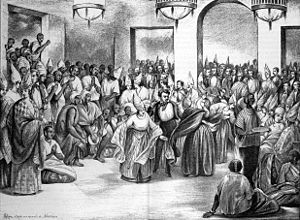Plaçage
Plaçage was a recognized extralegal system in French colonial territories and other areas of the early United States where European men entered into the equivalent of common-law marriages with women of African, Native American, and mixed race descent. The term comes from the French word placer meaning "to place with". These relationships were prevalent in the French colonies, including Louisiana, Martinique, Guadeloupe, and Haiti, as well as in other areas of the early United States such as New Orleans. Plaçage relationships involved both free women of color and enslaved women, offering some level of social and economic benefits in a society that denied these women legal marriage rights to European men.
Historical Context[edit | edit source]
During the 18th and 19th centuries, plaçage became a recognized part of the social structure in French and Spanish colonies. It was a time when racial hierarchies were strictly enforced, but the rigid lines of race and class were sometimes blurred by these intimate relationships. Women in plaçage arrangements often received financial support, education for their children, and sometimes freedom from slavery for themselves and their offspring. These relationships were not legally recognized as marriages, but they were formalized through contracts drawn up before notaries, known as contracts of plaçage.
Social and Economic Implications[edit | edit source]
Plaçage arrangements provided women of color and their children a certain level of protection and upward mobility in a society that otherwise offered little opportunity for advancement. The children resulting from these unions, known as gens de couleur libre (free people of color), often received education, property, and positions in the military or in business from their European fathers. This social and economic advancement was, however, limited by the overarching racial prejudices and legal restrictions of the time.
Cultural Impact[edit | edit source]
The plaçage system contributed to the rich cultural tapestry of regions like New Orleans, influencing the development of Creole culture. It also played a role in the evolution of the quadroon balls, social events where young women of color could meet potential European partners. Despite its contributions to the cultural and social landscape, the system of plaçage also reinforced the racial and gender hierarchies of colonial society, perpetuating the commodification of women of color and their children.
Decline and Legacy[edit | edit source]
The practice of plaçage began to decline in the mid-19th century as laws around slavery and racial segregation became more stringent, culminating in the abolition of slavery and the establishment of the Jim Crow laws. The legacy of plaçage, however, remains evident in the cultural and demographic makeup of places like New Orleans, where the Creole identity continues to be celebrated.
See Also[edit | edit source]
| This article is a stub. You can help WikiMD by registering to expand it. |
Search WikiMD
Ad.Tired of being Overweight? Try W8MD's physician weight loss program.
Semaglutide (Ozempic / Wegovy and Tirzepatide (Mounjaro / Zepbound) available.
Advertise on WikiMD
|
WikiMD's Wellness Encyclopedia |
| Let Food Be Thy Medicine Medicine Thy Food - Hippocrates |
Translate this page: - East Asian
中文,
日本,
한국어,
South Asian
हिन्दी,
தமிழ்,
తెలుగు,
Urdu,
ಕನ್ನಡ,
Southeast Asian
Indonesian,
Vietnamese,
Thai,
မြန်မာဘာသာ,
বাংলা
European
español,
Deutsch,
français,
Greek,
português do Brasil,
polski,
română,
русский,
Nederlands,
norsk,
svenska,
suomi,
Italian
Middle Eastern & African
عربى,
Turkish,
Persian,
Hebrew,
Afrikaans,
isiZulu,
Kiswahili,
Other
Bulgarian,
Hungarian,
Czech,
Swedish,
മലയാളം,
मराठी,
ਪੰਜਾਬੀ,
ગુજરાતી,
Portuguese,
Ukrainian
Medical Disclaimer: WikiMD is not a substitute for professional medical advice. The information on WikiMD is provided as an information resource only, may be incorrect, outdated or misleading, and is not to be used or relied on for any diagnostic or treatment purposes. Please consult your health care provider before making any healthcare decisions or for guidance about a specific medical condition. WikiMD expressly disclaims responsibility, and shall have no liability, for any damages, loss, injury, or liability whatsoever suffered as a result of your reliance on the information contained in this site. By visiting this site you agree to the foregoing terms and conditions, which may from time to time be changed or supplemented by WikiMD. If you do not agree to the foregoing terms and conditions, you should not enter or use this site. See full disclaimer.
Credits:Most images are courtesy of Wikimedia commons, and templates Wikipedia, licensed under CC BY SA or similar.
Contributors: Prab R. Tumpati, MD


